I’m a Scientist—Here’s Why You Can’t Miss the “Ring of Fire” Eclipse Tomorrow
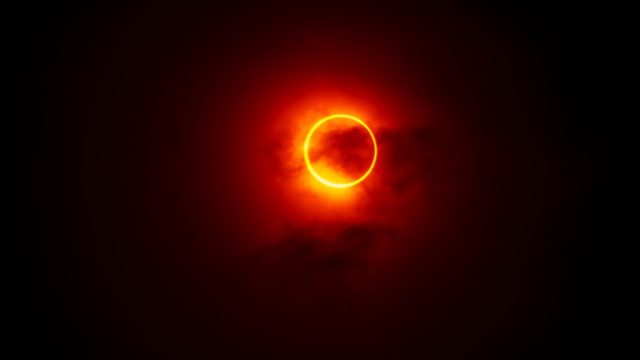
When it comes to cosmic events, some fall within the “must-see” category. For example, if you have a chance to catch a glimpse of the northern lights, you’d surely want to step outside and view the auroras. This weekend, there’s a different sight you won’t want to miss: a “ring of fire” solar eclipse. The name itself might be reason enough for you to get outside, but Don Lincoln, senior scientist at the Femi National Accelerator Laboratory, offers up additional thoughts on why you won’t want to miss this eclipse. Read on for what he has to say.
RELATED: Solar Eclipse Will Turn Sun Into a “Ring of Fire” Saturday—How to See It.
Tomorrow’s eclipse is unique.
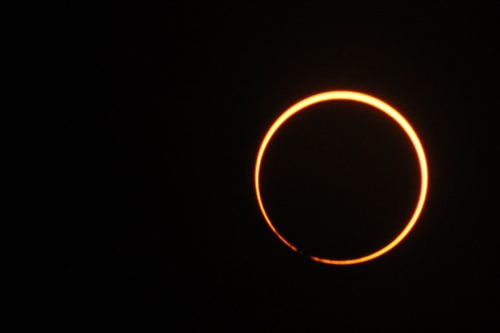
Tomorrow, Oct. 14, an annular eclipse will appear in the sky, according to NASA. Similar to a total eclipse, an annular eclipse occurs when the moon passes between the Earth and the sun, casting a shadow.
However, the annular eclipse differs because it occurs when the moon is at its farthest point from Earth, meaning it appears smaller than the sun and doesn’t completely cover it. That’s what creates the “ring of fire” effect around the shadow.
According to NASA, the eclipse will be visible along the Oregon coast starting at 9:13 a.m. PDT and will end on the Texas coast near Corpus Christi at 12:03 p.m. CDT. On its way, it will pass through parts of California, Nevada, Utah, Arizona, Colorado, and New Mexico. (If you do go outside to view it, make sure you have proper eye protection.)
RELATED: Upcoming “Ring of Fire” Solar Eclipse Has Experts Issuing a Safety Warning.
Viewing a solar eclipse is “a human experience,” according to Lincoln.
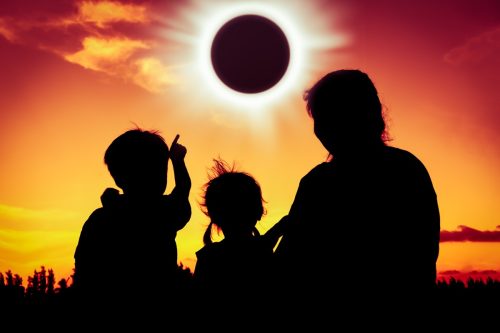
Roughly 4,000 years ago, Chinese astronomers described these kinds of eclipses as a “dragon eating the sun,” Lincoln notes in an opinion piece for CNN. People would bang pans and shout loudly to “scare away the dragon” and get light to return.
Today, we’re more matter-of-fact with our understanding of eclipses, but according to Lincoln, that doesn’t make the event any less magical.
“Our modern understanding of the phenomenon of solar eclipses is more mechanical, involving the motion of the moon, but even today, an eclipse is a breathtaking experience,” Lincoln says. “But, more than that, it’s a human experience, one in which people across the world and across time can share a moment of cosmic wonder.”
RELATED: 8 Amazing Things You Can See in the Night Sky Without a Telescope.
He describes his awe at seeing two specific eclipses.

Illustrating this, Lincoln describes a few separate occasions when he saw eclipses, the first being a partial eclipse when he was on a school playground underneath an overcast sky.
“As the moon began to pass in front of the sun, children stopped to watch,” he recollects. “Recess was extended that day, as the moon steadily blocked the sun, until all that was left of the sun was a silver crescent. Teachers and students alike joined together to enjoy the view.”
Lincoln notes that he then saw his first full eclipse in 2017, renting a hotel room in southern Illinois to “experience the maximum duration.” On this occasion, he was lucky to catch the eclipse in a cloudless sky.
“In that moment I wasn’t a scientist,” he writes. “I was just a person entranced by the astronomical display. I imagined what it must have been like for ancient people who had no understanding of celestial mechanics to see the sun disappear. It had to have been a mixture of fear and religious awe.”
“For good measure,” Lincoln jokes that he did actually bang a pot to scare the “dragon” away.
You only get so many eclipse sightings in your lifetime.
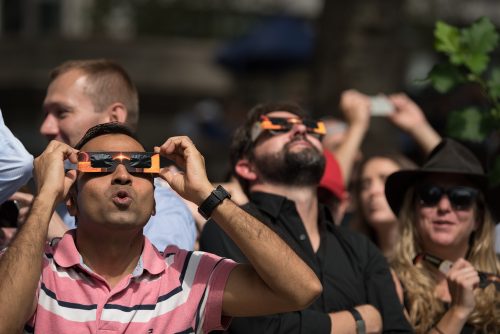
When describing his past experiences, Lincoln makes a compelling case for why you should view the eclipse tomorrow—but he also notes that it might be one of the only eclipses you’ll ever see.
“If you are one of the lucky people who lives under the path of maximum coverage, you should definitely go outside and look up. But even for those of you who live in places where the coverage of the moon will be only partial, it’s still worth your time to take in the sight,” he writes. “Unless you’re an eclipse chaser, you will only see a handful of eclipses in your lifetime. Be sure to see this one.”
And while it’s easy to cite other things you have going on in your life, Lincoln warns against missing out.
“We live in a constant ebb and flow of work and family, chores and responsibilities,” he writes. “However, there are certain events that are worth pausing for a moment to just take in and enjoy. I hope that you, like millions of others before you, will stop what you’re doing and turn your eyes to the sky. You won’t be sorry.”
RELATED: Intense Solar Storms May Peak Faster Than Expected—What That Means for Earth.
Another “celestial event” is slated for next spring.
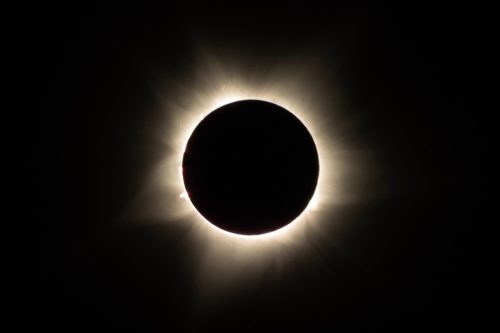
Still, if you have plans that interfere with tomorrow’s eclipse, you’re actually in luck. Lincoln notes that while the “ring of fire” eclipse will be “fascinating,” on April 8, 2024, there will be a total eclipse starting in the southern Pacific, then passing through Mexico and across the U.S.
RELATED: For more up-to-date information, sign up for our daily newsletter.